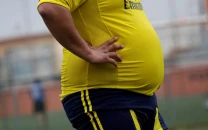7 tips you should follow to regain strength after Covid-19
From focusing on your diet to regular intake of vitamins, here is how you can go back to your stronger self in no time

While the Omicron variant of Covid-19 may not be as severe as the ones that have been detected in the past in terms of symptoms and hospitalisation rates, there is no gainsaying that it takes a toll on your physical health in more ways than one.
If you or a loved one tested positive for Covid-19 and did not eat as much whilst being infected, your muscular strength may have declined over the course of two weeks. After you have fully recovered, it’s important to work towards rebuilding it.
From focusing on your diet to a regular intake of vitamins, here is how you can go back to your stronger self in no time, as compiled from Healthline.
Eat on schedule
Create an eating plan and make regular meals and snacks part of your routine. Eating up to four to five small meals a day that will help provide your body with the nutrients and calories you need to restore strength and immune function. Options for snacks (meal three or four) can be nuts, fruits or vegetable smoothies.
Protein
Eating enough protein (fish, poultry, other meat, dairy, beans) at every meal is essential to help stimulate muscle growth and prevent a continued breakdown of muscle. Coupled with physical training, eating protein will result in improved strength over time. Eat 25 to 40 grams (3.5 to 6 oz) of protein for each meal and 10 to 20 grams (1.5 to 3 oz) for each snack. Use ready-to-drink protein shakes or energy bars to help you meet your protein needs if you find it difficult to do so by eating enough.
Monitor your weight
This is certainly not the time to diet for weight loss. Once your weight has returned to your pre-illness weight, or a stable and reasonable weight if you were overweight, make sure to eat enough calories. For the first week in your post-recovery phase, ensure to consume at least 1500 calories per day.
Vitamin C and Vitamin D
Vitamin C helps keep your immune system healthy. It is found in many fruits and vegetables. You can eat an orange with breakfast, some sweet red pepper in a salad or on your sandwich at lunch, and some tomato sauce with dinner or mango with dessert. Vitamin D is found mostly in seafood and meat and, to a lesser extent, in yoghurt, nuts and beans.
Calories
It is important that you eat enough calories in addition to well-balanced meals. This reduces stress on your body, allowing the food you eat to go towards rebuilding your strength. Round out your protein portions with vegetables, fruits, whole grains or other starches such as brown rice, potatoes, whole grain bread and beans, which have significant concentrations of both carbohydrates and proteins.
Calcium
This is an important nutrient for bone health. As you lose muscle, you lose bone density. Calcium-rich foods are essential to help keep the bone mass you have.
Getting 1,000mg to 1,200mg of calcium each day is important for bone health. Your body can only absorb 500 mg of calcium at one time, so enjoy a calcium-rich diet at different meals and snacks throughout the day.
Hydration
Staying well-hydrated is always important, but especially so when you are sick. As we get older, our thirst sensation is not as acute, and we tend to drink less. So, like eating, it is a good idea to drink on somewhat of a schedule. Good examples of fluids would be milkshakes, water and fresh juice.
Have something to add to the story? Share it in the comments below.



















COMMENTS
Comments are moderated and generally will be posted if they are on-topic and not abusive.
For more information, please see our Comments FAQ